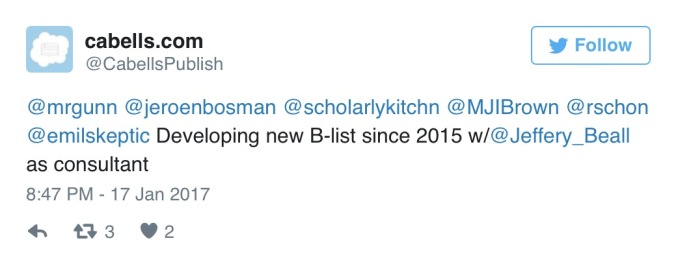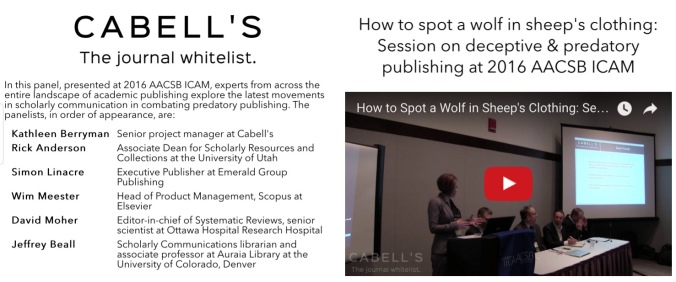
Contradicting Cabell’s tweet, Jeffrey Beall says he is not working as a consultant
Contrary to what Cabell’s International, a publishing services company, had said in a tweet on January 17 that Jeffrey Beall has been working with them as a consultant since 2015 to develop a B-list of predatory journals and publishers, Prof. Beall denies any connection with Cabell’s in a Facebook chat with me today at around 6.30 pm local time in India.
“I don’t have any connection with Cabell’s. I understand they will be launching a blacklist this spring, but I know very little about it,” Prof. Beall says. He apparently was not aware of the tweet by Cabell’s. When pressed further for details based on Cabell’s tweet he says: “All I can say is that I have not consulted formally with Cabell’s. I have not earned one penny from them. Yes, I have met them at conferences, but there is no formal consulting going on, no money exchanging hands. No! I am not helping them in any way.”
He politely refused to divulge the reasons for shutting down his blog saying: “I am sorry; I cannot comment on that.” But he did mention that his lists are available on the “Wayback machine”.

Jeffrey Beall
Responding to my observation that all his expertise on predatory journal publishing would go waste if he stays away, his anger or frustration with the Open Access advocates became amply evident. “Well, the Open-Access advocates always criticised my expertise, so perhaps they can work on solving the problem of predatory publishing,” Beall says.
Future plans
“Yes, I still work at the University [of Colorado Denver]. I am still trying to figure out what my new research agenda will be. I have no plans to return to this work [preparing and updating a list of predatory journals and publishers]. I have no plans to create or publish any lists of publishers. I want it to be something much more quiet than predatory publishers. By “quiet” I mean non-controversial,” he says of his future plans.
Filling the void
To my query on who can fit into his big shoes and match his expertise he says: “It’s clear that my abandoning this work has left a void. How will the void be filled? The publishing industry already has an initiative, called “Think, Check, Submit” that was a response to my work, but I am not sure it is having any effect or really addressing the problem.”
Unlike his list, does he think that “Think, Check, Submit” has any effect at all in exposing and warning people of the dark side of predatory journal publishing and is he aware of any other initiative that matches his? “Think, Check, Submit is having no effect. I know of no other blacklists. Many of my critics argued that anyone could easily identify predatory journals without the need of any list. They said that predatory journals were obviously predatory, and that my work was unneeded,” Beall comments.
To my comment that his lists helped the scientific community, especially people who did not genuinely know which is a predatory journal, his answer is terse: “Yes, agree.”
The time at Denver was 6.21 am and I had chatted with him for 15-20 minutes. Though I wanted to ask him many more questions and feared that I might not be able to connect with him again he had to go. “Prasad, sorry, I need to get ready for work. It is 6:21 am here! Thanks,” he says. But before going signing off he did permit me to share the content of the chat in my blog.
Beall, wherever you are and whatever you do, let me wish you the very best. I saw a good friend in you and professionally you were a huge help to me whenever I wrote about predatory journals. Wonder who would take that place now. I don’t see anyone in the horizon. Many in the scientific community might have disagreed with you on many issues, but many have thoroughly appreciated your selfless, single-minded initiative. Good bye, I’ll miss you, the scientific community too will miss your valiant efforts to call a spade a spade. Take care.
UPDATE – Cabell’s responds

Jeffrey Beall’s name figures last in the list of panelists at Cabell’s website.
February 4: Cabell’s International responded to the story saying: “We regret to learn in this manner that Mr. Beall viewed our relationship in a different light than we had. The fact remains that Cabell’s has been developing a blacklist for almost two years and on many occasions, our team has sought advice and received resources and guidance from Mr. Beall. Since the inception of our blacklist project, Mr. Beall has regularly provided us with notes, evaluations, evidence, methodology and his personal insights regarding developing and maintaining a blacklist. Our team has exchanged research with Mr. Beall via emails, text messages, phone calls and in-person meetings. Mr. Beall co-presented on a Cabell’s hosted panel about predatory publishing, which is currently on our website (www.cabells.com). It is unfortunate that we have misjudged, until now, the character of these interactions. We look forward to continuing our blacklist in a manner consistent with the actual needs of the scholarly community.”
Pingback: Where’s the Scholarly OA blog and the Predatory Journal List? (Second Update, 2.13.17) – Pamela Donovan
I think Beall was obliged to work on making his list sustainable and not just shut it down. Academic honesty is still a big issue in many countries, and those who denounced extensive publishing in predatory journals by referring to Beall’s List are now, kind of, disarmed. Hope Cabell or someone else comes up with a Blacklist rather soon and keeps it up-to-date.
Have you ever published this type of views or opinions in Indian news media? just curious to know. For example, on scientific misconduct by Indian scientists. Please give me a link.
As alternative to the list you might also consider the Quality Open Access Market (https://www.qoam.eu). Basically it’s a rating platform consisting of two kinds of ratings:
1. Base Score: A formal rating regarding transparency about Editorial information, Peer Review, Governance and Workflow. Anyone can give a rating.
2. Valuation Score. A qualitative rating from authors, reviewers or editors of the specific journal.
We regret to learn in this manner that Mr. Beall viewed our relationship in a different light than we had. The fact remains that Cabell’s has been developing a blacklist for almost two years and on many occasions, our team has sought advice and received resources and guidance from Mr. Beall. Since the inception of our blacklist project, Mr. Beall has regularly provided us with notes, evaluations, evidence, methodology and his personal insights regarding developing and maintaining a blacklist. Our team has exchanged research with Mr. Beall via emails, text messages, phone calls and in-person meetings. Mr. Beall co-presented on a Cabell’s hosted panel about predatory publishing, which is currently on our website (www.cabells.com). It is unfortunate that we have misjudged, until now, the character of these interactions. We look forward to continuing our blacklist in a manner consistent with the actual needs of the scholarly community.
Thanks for sharing your version of the relationship with Jeffrey Beall.
Mr Prasad: Majority of Indian authors publish in predatory journals. Why don’t you do something on this? Awareness is important!
Professor Beall’s obsessive hatred of everything open access affects his objectivity. Furthermore, “Think, Check, Submit” is actually rather useful for anyone unsure about where to place a submission. But it is very interesting to learn that Beall is not connected to Cabell, and that therefore Cabell’s announcement was misleading, to put it mildly.
I didn’t get any inkling that Beall had an “obsessive hatred of everything open access”, I used Bealls list, as indeed did my university, as a source for consideration/info/checking. But I can agree that objectivity is lacking in many people, but not necessarily Beall. Excuse my mildness
You can get a good idea of Beall’s stance on OA by reading these two opinion pieces.
Beall, J. (2013). The Open-Access movement is not really about Open Access. tripleC, 11(2), 589-597. http://www.triple-c.at/index.php/tripleC/article/view/525
Beninger, P. G, Beall, J. et Shumway, S. E. (2016). Debasing the currency of science: The growing menace of predatory Open Access journals. Journal of Shellfish Research, 35(1), 1-5. https://doi.org/10.2983/035.035.0101
Just to get an idea, here are a few excerpts from each (but do read the papers if you fear they have been taken out of context, and draw your own conclusions).
From the first.
“The OA movement is an anti-corporatist movement that wants to deny the freedom of the press to companies it disagrees with.”
“OA advocates […] from their high-salaried comfortable positions they demand that for-profit, scholarly journal publishers not be involved in scholarly publishing and devise ways (such as green open-access) to defeat and eliminate them.”
From the second.
“… the OA model entails more than the idealistic “free science for all” concept, but acts both as an impediment to genuine science publishing for researchers with few resources, and as an open floodgate to the uncontrolled publication of information bereft of any quality control.”
“… the OA model […] is a remedy far worse than the perceived original disease.”
“we believe that science, the cornerstone of modern human civilization, now faces an existential threat.”
While I don’t agree with his views on Open Access, have found his lists on predatory journals and predatory publishers very useful.
I also think black lists, as well as white ones (like DOAJ) can indeed be useful, but (1) they must be reliable; (2) they should not be the sole way to assess a journal (when, for instance, choosing a publishing venue).
The problem with Beall’s list was that the way it was managed raised many issues concerning its reliability (although I believe many of its entries were plentily justified).
Personnally, I think DOAJ is doing a very good job. It even has a couple of black lists (journals falsely boasting DOAJ inclusion; journals removed after been evaluated according to new, more stringent criteria), though they’re not displayed prominently on their site (it’s their choice).